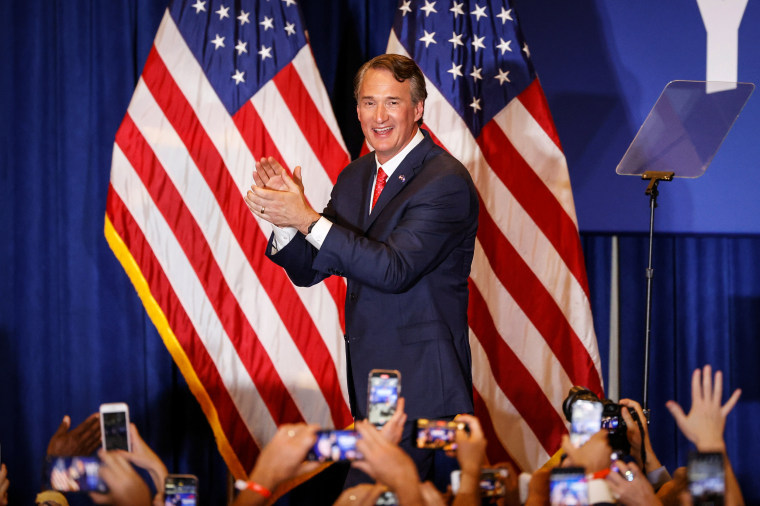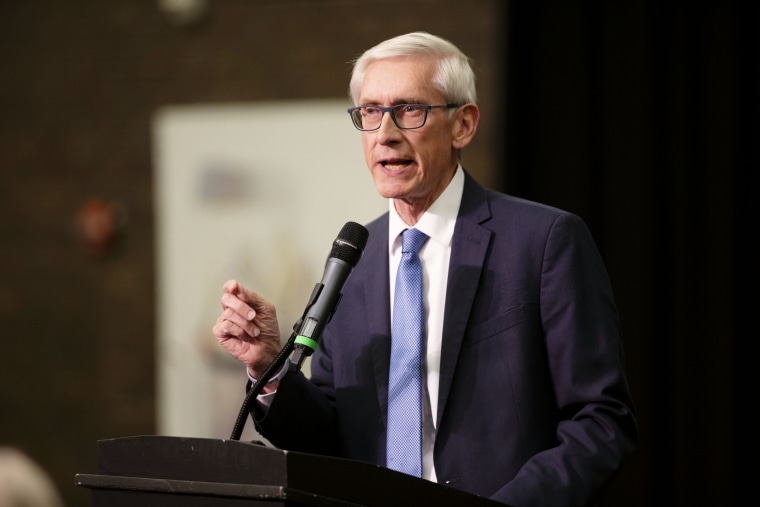Wisconsin Republicans have been studying Glenn Youngkin’s victory in Virginia last fall for lessons on how to claw back the governor’s mansion from Democrat Tony Evers this fall.
The biggest item they’re cramming on? Critical race theory.
Youngkin won his gubernatorial race — in a state President Joe Biden carried in 2020 by 10 percentage points — partly by stoking alarm over the controversial education topic, melding it with voters' frustrations over pandemic school closings, and leaning in to a push by conservatives to attack a wave of race-focused curriculum changes. The approach was part of a strategy to animate his base without alienating moderates, and won him enough support from women and suburban voters to steal victory from a strong Democratic opponent.
And now, with the GOP primary kicking into gear in Wisconsin, the two leading candidates to receive their party's nomination — Rebecca Kleefisch, the former lieutenant governor under Gov. Scott Walker, and Kevin Nicholson, a businessman and ex-Marine — are pushing hard on the issue, hoping they can emulate Youngkin's success in the purple state.

Their heavy focus on how race is taught in schools thrusts further into the spotlight GOP attempts to make education policy a campaign strength. But in Wisconsin specifically, it's a particularly salient area for Republicans challenging Evers, a former state schools superintendent whose entire pre-political career was in public education.
“He is the ideal target for those kinds of attacks for many reasons and you’ll see that play out here, taking him on, so to say, on his own turf,” said Charlie Sykes, a former conservative talk radio host in Milwaukee and current editor-in-chief of The Bulwark, a conservative news site. “Secondly, the battlefield in Wisconsin will once again be suburban voters, and this is an issue that Republicans can use to go back to suburban voters and suburban women to say, look we’re on your side, and it may be a way to win that very important constituency back.”
Disdain on right, despite limited evidence of a problem
Republicans across the U.S. have pushed critical race theory into the spotlight in recent years, aptly and at times misleadingly folding charged topics like racism and white privilege into a broader policy discussion about how much say parents should have over what's taught in their kids' classrooms. GOP governors in at least eight states have banned it from lessons in public schools, and conservative state legislators, in just the first three weeks of 2022, introduced more than 70 bills in 27 states seeking to limit the teaching of racial equity and white privilege.
In many cases, politicians have conflated the term “critical race theory” — the academic concept typically taught in college courses to examine how laws and institutions perpetuate racism — with broader lessons surrounding race. Some conservatives, including politicians like Florida Gov. Ron DeSantis, a Republican, have used the term to describe ideas and books that they believe are too progressive or political for the classroom.
Whether critical race theory is even universally taught in Wisconsin public schools has been strongly contested. Educators and Democrats say the concept is not taught in any public K-12 schools in the state. Education and civil liberties groups have pointed out that Wisconsin teachers are, under state law, required to teach about “concepts of race and diversity” and that efforts to do so, especially in the years since the murder of George Floyd, have been vilified under the umbrella label of critical race theory. The MacIver Institute, a conservative think tank based in Madison, has published its findings from several school districts around the state that it says show that critical race theory is taught in Wisconsin public schools.
The subject quickly became a hallmark issue for Kleefisch since she launched her campaign in September. She has invited anti-critical race theory activists to campaign events and has herself, according to her campaign, endorsed 38 school board recall efforts across the state, in which critical race theory has emerged as an important issue. Her Rebecca PAC has in recent months given money to more than two dozen school board candidates in the state.
Carole Olkowski, of Thiensville, the Milwaukee suburb that was the site of one of most highly publicized school board recalls Kleefisch was involved in, said she’d be voting for Kleefisch because of her full-throated opposition to critical race theory and loud support of parental rights in the school system.
“A lot of it, critical race theory, is taught to children who are far too young to hear it, and it’s not often approached in a proper way. I think it can be harmful,” said Olkowski, a self-described independent who voted for Trump in 2020.
Nicholson, who jumped into the race last month, has also made his opposition to critical race theory a central component of his campaign. His No Better Friend Corp., a conservative nonprofit, highlights among its top issues “education reform” and fighting critical race theory. In a statement to NBC News, Nicholson said the topic “attempts to pit Americans against each other” and that “Evers has allowed this intellectual poison to seep into Wisconsin’s schools.”
Making Evers a ‘bogeyman’
Polling over the last six months found that 42 percent of Wisconsin voters said they weren’t familiar enough with critical race theory to offer an opinion of it. Of those who recognized the concept, 26 percent said they favored teaching it in schools, while 30 percent opposed teaching it.
Confusion over what the label means has given Republicans an opportunity to define it in purple states like Wisconsin, where voters in the suburbs of Milwaukee County could determine who the next governor will be. Evers won in 2018 by fewer than 30,000 votes. President Joe Biden won in 2020 by fewer than 21,000 votes.
“The amount of people who still aren’t terribly familiar with critical race theory definitely gives both parties an opening to define it, and we’ve certainly seen the Republicans in our state do that more effectively,” said Charles Franklin, the director of the Marquette University Law School poll.

Strategists said that the issue could turn an area of strength and expertise for Evers into a weakness.
Evers ran in 2018 on a platform that leaned on his experience in education. As governor, he’s broadly increased funding for public schools, specifically in the areas of special education and mental health.
But those perceived strengths have been upended, as he’s had to confront growing conservative enthusiasm for the anti-CRT movement. Last month, he vetoed a bill that would have barred Wisconsin public schools from teaching students about and training teachers in such concepts as systemic racism and implicit bias.
“That bill, forcing him to veto it, absolutely corners him into being a kind of bogeyman on this issue, especially given his background. There’s nothing subtle about it,” Sykes said.
The need for a message
Despite the momentum on the issue for Republicans, Democratic strategists point out that the recall Kleefisch was most closely aligned with — an effort by anti-critical race theory activists to recall four members from the Mequon-Thiensville district in suburban Milwaukee — failed.
“The school board race this past year in Mequon, it didn’t work. It’s not clear to anyone that it will work in a state like Wisconsin,” said Sachin Chheda, a Democratic strategist in Milwaukee, who ran Evers’ 2009 state superintendent race. But, Chheda and others added, it remains a highly effective way for conservatives to amp up voter turnout.
In a statement to NBC News, Evers' spokesperson Sam Roecker said, “Republicans are more focused on using Wisconsin kids as pawns to score political points and further divide our state.”
Strategists and pollsters, however, warned that Evers — whose approval rating in the state is on the decline and who early polls show would be locked in a dead heat with Kleefisch in a hypothetical matchup — must not underestimate the power the issue holds with voters, even as narratives surrounding the gubernatorial race might shift to other topics, including voting access and election administration.
“These kinds of attacks, on something that should be the candidates’ strength, really forces the candidates being attacked to find ways to turn the area back into a strength,” Marquette’s Franklin said. “He’ll have to come up with an answer. We haven’t seen that yet.”
